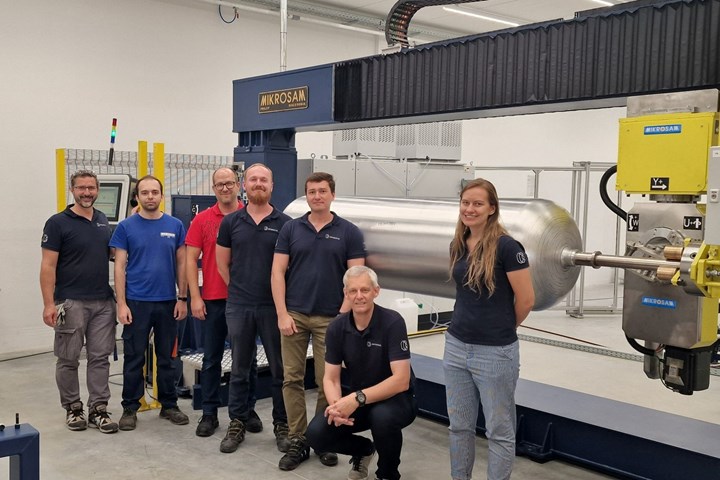Cryomotive to manufacture first CRYOGAS hydrogen storage vessels using Mikrosam winder
Carbon fiber-reinforced composite cryogenic compressed (CcH2) system offers up to 80 kilograms of H2 and 1,000 kilometers of range for heavy-duty truck and bus applications.

Photo Credit: Cryomotive and Mikrosam
Hydrogen mobility startup Cryomotive (Taufkirchen, Germany) has reached an important milestone in its roadmap to develop and produce its CRYOGAS cryo-compressed hydrogen (CcH2) pressure vessels, designed to carry CcH2 at a density of 72 grams per liter or more to enable long-haul truck and buses a range of more than 1,000 kilometers per tank.
The company was found in October 2020, and aims to enter its technology into the market for small-series applications in 2024. Working toward this goal, Cryomotive has recently received and commissioned a new, automated winding machine from Mikrosam (Prilep, Macedonia) and its first full-size liners for heavy-duty truck tanks are ready to be reinforced with a proprietary carbon fiber-reinforced composite.
Cryomotive’s first generation CRYOGAS onboard H2 storage system will consist of two insulated pressure vessels to store up to 80 kilograms of cryogenic H2 gas generated by either cryo-compressing liquid hydrogen (LH2) or by cryo-cooling gaseous hydrogen (GH2). The integrated first generation Cryomotive frame-mounted CRYOGAS CcH2 storage system will be able to provide GH2 in a well-defined temperature range with an adjustable pressure up to 3 MPa (30 bar) suitable to power any fuel cell or hydrogen internal combustion engine powertrain.
As reported by AutoFutures in January 2022, Cryomotive’s technology is being developed as part of the 3.5-year CryoTRUCK consortium project, begun at the start of 2022 and funded by the German Federal Ministry for Digital and Transport (BMDV). Additional consortium partners include commercial vehicle manufacturer MAN Truck & Bus (Munich, Germany) and vehicle retrofitter Clean Logistics (Winsen, Germany). The goal of the project is reported to be development of a high-capacity cryogenic hydrogen gas storage system with fast refueling technology, aiming for a range of 1,000 kilometers per tank fill and a refueling time of 10 minutes.
Dimitar Bogdanoski, sales manager at Mikrosam, says, “We’re happy to have Cryomotive as our customer. It is shows how filament winding machines with a lot flexibility to go from development to full production scale are essential in enabling a greener energy future.”
Related Content
-
Honda begins production of 2025 CR-V e:FCEV with Type 4 hydrogen tanks in U.S.
Model includes new technologies produced at Performance Manufacturing Center (PMC) in Marysville, Ohio, which is part of Honda hydrogen business strategy that includes Class 8 trucks.
-
Hexagon Purus opens new U.S. facility to manufacture composite hydrogen tanks
CW attends the opening of Westminster, Maryland, site and shares the company’s history, vision and leading role in H2 storage systems.
-
Composites end markets: Automotive (2024)
Recent trends in automotive composites include new materials and developments for battery electric vehicles, hydrogen fuel cell technologies, and recycled and bio-based materials.

.jpg;width=70;height=70;mode=crop)















